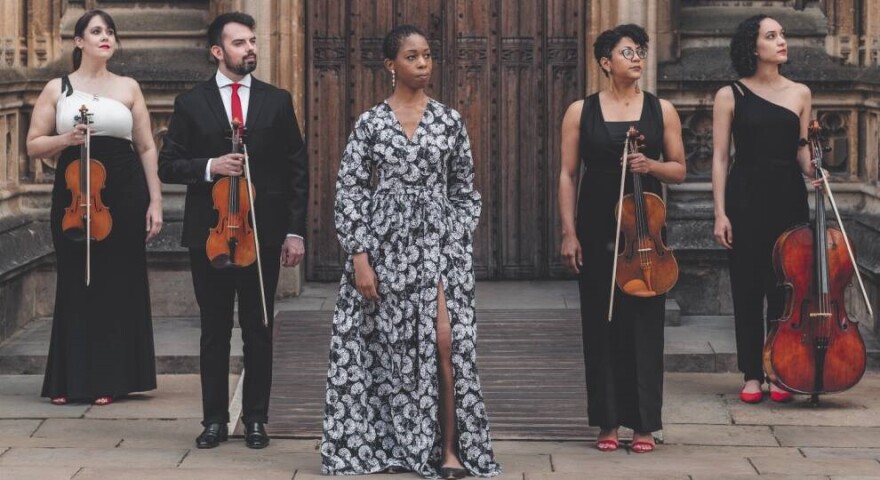This year, Castle of our Skins is celebrating 10 years of fostering Black music and cultural exploration in the Boston area through educational initiatives and concerts. Castle of our Skins has highlighted the achievements of diverse Black artists from both past and present. As they celebrate their past decade of work, Castle of our Skins is preparing to release a debut album called "Homage: Chamber Music From Across the African Continent & Diaspora." The album comes out on March 1 and will coincide with a series of concerts this spring. Ashleigh Gordon, the artistic and executive director of Castle of our Skins and violist on the album, spoke with Arun Rath on GBH's All Things Considered. What follows is a lightly edited transcript.
Arun Rath: So I get a sense of what Castle of our Skins has been doing for the past 10 years, but tell us about the story behind it?
Ashleigh Gordon: So we are in our 10th year. And "we" is very much a team effort: Castle of our Skins was co-founded by myself and Anthony R. Green. We met when we were doing our masters [degree programs] at the New England Conservatory ... and wanted to be able to have a platform to celebrate each other: Anthony being a fantastic composer and performer, social justice artist; myself being a violist.
And both of us being very inquisitive people, during our studies ... we didn't come across names of Black composers. And oddly enough, here in Boston, where there is such a rich history — New England Conservatory, Boston Conservatory — many, many historic as well as living composers and musicians have come through the Boston area specifically. [That] was not necessarily front and center in popular imagination and presented in curriculum, presented on stages, etc. And we found that we had an opportunity to be able to do that.
So what started as a single concert, both of us being educators also creating a single educational experience, 10 years ago has really bloomed into residencies and opportunities to engage with musicians, historical composers from over 500 years in multiple continents, all being African diasporic, commissioning projects, publications — this one certainly being our debut album — but publications as it relates to culturally responsive curriculum guides. A little bit of sky's the limit for us to be able to again engage in ways that foster cultural curiosity and support Black artistry.
Rath: And tell us about this debut album, "Homage," because after 10 years, I have to imagine with your first album, there's a lot of thinking that went into what was going to go on here?
Gordon: Well, every project really starts from a conversation and relationships, so this is certainly no exception for us and the relationship being between Castle of our Skins and Dr. Samantha Ege. We met, I think it was in Boston, some years ago. She was here and at a conference when she was living in England. And Samantha is a preeminent Florence Price scholar and a scholar of largely Black women, but women composers through her own work as a scholar and as a practicing pianist.
Rath: You mentioned Florence Price who was, I only just discovered, an incredible composer who went to the New England Conservatory, right?
Gordon: Yes, she did. So roots very much deeply connected and feeling like we are being able to, as Florence Price was also very much an educator, being able to teach and share through our work and stages as well as in classrooms.
Rath: So, Florence Price is one of the composers I'm familiar with. I have to say, with one exception, Coleridge-Taylor, everyone else on this "Homage" album are composers that I was sadly unfamiliar with. You talked initially about about the difficulty of finding some of these great composers who have been here under our noses the whole time. How do you find these these artists?
Gordon: The composers on this particular album, Dr. Bongani Ndodana-Breen, we met a few years ago when he was doing a Harvard Radcliffe fellowship and thought it would be great to be able to connect and share and engage with his scholarship and certainly his music-making. And we're able to have his "Safika," his piano quintet on this album. Frederick C. Tillis used to teach at the University of UMass Amherst, an amazing composer who has dozens of spiritual fantasies, this one being on this particular album, his "Spiritual Fantasy No. 12." It's just such a colorful way to imagine the spiritual art form.
Samuel Coleridge-Taylor, who you reference is an Afro-British composer — is also the name of my cat, for those that know my cat — but he was also a composer who very much was inspired by the sort of post-Civil War reconstruction, Black identity formation that was happening in this country and tapped into very much spirituals and folk songs, also really inspired and deeply engaged in same way with Native American plight of freedom and identity formation.
Zenobia Powell Perry, we have one existing piece of her "Homage," which is very fitting, as the album is called that as well. And then Undine Smith Moore, who a name we may hear along with Florence Price and William Grant Still as the dean of African American composers. Undine Smith Moore was known as the dean of African American women composers, and very rightly so, as she taught over 40 years, I believe in Virginia, and created her own center for Black music research ... and shared like Florence Price as an educator, shared so much knowledge and inspiration for so many generations. Her "Soweto" is very deeply rooted in those post-apartheid South African experience and again, plight for freedom.
Rath: Ashleigh, it's been such a pleasure speaking with you. Thank you. And also as a music fan for for bringing this work out. Thank you for that.
Gordon: My pleasure.


